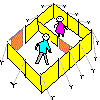I'm sorry rthome7.
How do you bring up this subject and then just disappear?
You have a very interesting idea - it's also very new to me.
Maybe you could explain these two types of love?
That would have been very interesting and edifying for both the male and female human species - we could learn about love - it's never enough.
HOW would you have liked this thread to proceed?
I could post a thousand links - do we then not discuss them?
Are we just to read them and leave?
Come back and tell us about the two different types of love.
I don't have a lot of time to read links, and I'd appreciate the knowledge.
Wondering
Greetings
We need to ask does the trinity express love differently and uniquely as a family does with maleness love and femaleness love....such terms do not refer to gender for God is not like man, but is a reference to the two love words in Scripture "Ahab" and "Ahabuh"
HYPOTHESIS: What does "ahad" mean?
INTRODUCTION: Nearly all people see "love" as a single concept. The Bible actually has "two" concepts for "love", and while both genders express love, the concepts relate to personality traits. The two Hebrew words for love are "ahad" and "ahabuh". Most translations translate both words as "love" but this is missing the Hebrew context of culture altogether. There is much to learn about Hebrew "love" if we study these two words carefully. See also
study of "ahabuh" or "femaleness-love".
METHOD: All words in OT Hebrew studied. Where possible NT Greek is converted to equivalent OT Hebrew. The Greek word "agape" is the same as Hebrew "ahab" and thus studied here. It is not as some Pastors see, "agape" as some mystery love that only belonged to God.
PICTURE:
The pictograph reads "The Strong Person ! Behold! in the Home"
CONCLUSION: The Hebrew word "ahab" means "maleness-love". This is a personality trait mostly expressed by gender males, but sometimes also by gender females, and is the "love" that "provides, protects and guards".
PERSONAL APPLICATION: The Hebrew pictograph tells us an interesting concept into "maleness-love".
[img width="20" height="20" src="
http://spiritualsprings.org/images/A.gif">
Strongs 1,2,3,4. Here is the Hebrew word for "father". The strong one in the home. It is also the meaning for fruit, because Dad was the bread winner, the one who brought good things like food into the home.
Strongs 253,337, 338. This word is the "Strong Person! Behold!" in this case bellowing as a cow for a lost calf, or parents yelling for their lost child, or one who sighs strongly for something gone.
Strongs 1887, 1888, 1889. The person Behold! Meaning to draw attention to something important. This a direct contrast to the Hebrew word to "sigh" or "bellow".
....
Strongs 157. When the Strong Person flows in the home, such actions are known as his love. From this family concept, the strong person flowing in the home, is what we term "love" and is the Bible's definition of "love". Notice this father's actions in the home is a direct display of his love in the home. Thus the father's love
(1) protects
(2) provides
(3) shelters
(4) guards his family, keeping them safe.
The discussion will add further details to the "maleness-love" study, one that promises to surprise and amaze....! There are many verses to read and study...some 300+ of them...
DISCUSSION:
maleness-love theme

And
HYPOTHESIS: What does "ahabuh" mean?
INTRODUCTION: The study of
maleness-love and femaleness-love should be interesting, especially to compare the two concepts of love. The Bible does not have a single word for "love", it has two words for love, "ahab" and "ahabuh". What do these two words mean ? And how do they relate to each other in contexts?
METHOD: All words in OT Hebrew studied. Where possible NT Greek (phileo) is converted to equivalent OT Hebrew.
PICTURE:
The pictograph reads "The strong Person Behold! in the Home, (relating to another) Person. Behold!"
CONCLUSION: The Hebrew word means "femaleness-love", not strictly related to sexual gender, but a personality trait to show fellowship love, nurture love, or marriage-like love.
PERSONAL APPLICATION: The application of this word is interesting. Femaleness love is relational as the pictograph of the word shows. Femaleness love is emotionally based, whereas maleness-love is physically based, as broad summations.
DISCUSSION:
For more details please read the discussions, of 100+ verses.
femaleness-love theme

Shalom












 , lol
, lol